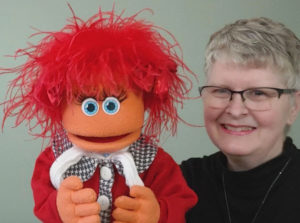Author Archive: directorifi
How do you correct a child who equates forgiveness with revenge? I sometimes hear my son saying to his friend that they can be buddies again only if he can hit him back.
I think you need to first ask your son this: If you hit your friend, do you think he will feel pain? Then you need to ask this: “What is forgiveness? Is it gentle?” Try to get your son to see the large difference between causing pain and giving tenderness and love. Once your child sees this difference, he likely will abandon the idea that hitting is equated with forgiving.
‘Puppets for Peace’ video presentations now featured in Pre-K and Kindergarten IFI curriculum
Mary Lou Coons, who was recognized with a Partnership Achievement Award in December 2022 by the International Forgiveness Institute (IFI), is a ventriloquist and the founder of Puppets for Peace. She has recently produced, together with her red-haired puppet Lily, video recordings of all the children’s books referenced and used in Dr. Enright’s Pre-K and Kindergarten IFI curriculum guides including:

Mary Lou Coons, Founder of ‘Puppets for Peace’, and her red-haired puppet, Lily.
PRE-K
- You Are My I Love You
- No Matter What
- Fill a Bucket
- I Love My New Toy
- A Birthday for Frances
- Papa, Do You Love Me?
KINDERGARTEN
- I Love You Stinky Face
- Little Fur Family
- It’s Not Easy Being a Bunny
- Will You Forgive Me?
- The Runaway Bunny
The videos, which range between roughly three to six minutes, include an introduction by Lily with Mary Lou reading the entire book, word for word. She also produced a 10-minute video recording of Dr. Enright’s Rising Above the Storm Clouds (part of the 4th-grade curriculum program), the only video version of the book available anywhere.
The IFI offers teachers and others who obtain curriculum guides a directory of online video recordings that can supplement the guides and be shown to students who are learning about forgiveness. We are extremely grateful to Mary Lou that we can now include her ‘Puppets for Peace’ videos as supplements for the Pre-K, K, and 4th-grade curriculum!
‘Peace in the Wake of Pain’ highlights the science – and healing potential – of forgiveness
The Summer 2023 edition of On Wisconsin, the University of Wisconsin’s magazine for communicating with alumni and the general public, features a full-length interview with Dr. Robert Enright, highlighting how he developed the study of forgiveness over his years in academia to contribute something of real value to people who are suffering.

Dr. Robert Enright
Dr. Enright, International Forgiveness Institute co-founder, shares how an academic crisis led to his studying of forgiveness. As he is quoted in the article, he began to wrestle with the question, “What happens to people when they’re thrown to the mat of life by others being unfair? How do they get out of that?”
The article, entitled ‘Peace in the Wake of Pain’, goes on to share how Dr. Enright and his team have helped abused youth, prison inmates, and others who have experienced deep pain and anger discover healing and peace through entering into the process of forgiveness.
The On Wisconsin feature is a wonderful opportunity for many people to hear the good news about forgiveness and its potential for healing, peace, and restoration for individuals, families, and communities. Please share generously!
“Over the past 35 years, Enright and his colleagues have worked almost exclusively with people who have been deeply traumatized and are looking for a way out of their pain,” according to the article. “Enright says people who have suffered deeply for a long time — victims of domestic abuse, incest, and political violence, for example — are often the most likely to commit to the difficult process of forgiving the injustices done to them.”
I am beginning to realize that a huge obligation of anyone who writes about forgiveness or who is a mental health professional aiding people’s forgiveness is this: The writer or helper must take the time to deeply understand what forgiveness is and is not in its true sense, in its essence. This takes time, study, and reading works that show maturity and accuracy. I now am a bit discouraged because I do not see this happening nearly to the extent that it should be happening. What do you think?
I agree with you that scholars and practitioners have the “huge obligation” of taking the time to very deeply know what forgiveness is in its fullness, in its essence. I agree that there should be more time devoted to examining the “works that show maturity and accuracy” without reductionism or the search for continual innovation, which is so rewarded in academia. If a person comes up with a new twist on forgiveness (or any other variable) this is often seen as an innovation or an advance, when too often it splits the construct, reduces the construct, and therefore distorts the construct. For example, talking of “emotional forgiveness” as if this is a kind of forgiveness is confusing “kind” and “component,” a very large difference. Emotions are a component of forgiveness, that includes much more than this. Emotions by themselves are not a “kind” of forgiveness. If that were the case, then motivations, cognitions, and actions could be deleted and you still have forgiveness. Does this sound accurate to you when your goal is to understand the essence, the whole picture of what forgiveness is?
From your recent posts here, it seems that there are many misunderstandings about what forgiving is. Why do you think there are so many misunderstandings out there?
I agree that there are many misunderstandings of forgiveness in the general public, in mental health professionals who are trying to help people to heal, and in scholars who publish articles on forgiveness. I think this is the case because most people, including mental health professionals and scholars, have never examined the term forgiveness from a philosophical perspective. This often results in a failure of understanding what Aristotle called “the specific difference” between forgiveness and other related ideas such as “just moving on” or reconciling or even just engaging in a few psychological techniques such as writing a letter that is not sent to the offending person. Forgiveness as a moral virtue takes time and practice. It includes thinking in new ways about the offending person, waiting for softer emotions to emerge, and deciding whether or not to reconcile. So often people miss some or even all of these important points, thus distorting what forgiving actually is.



